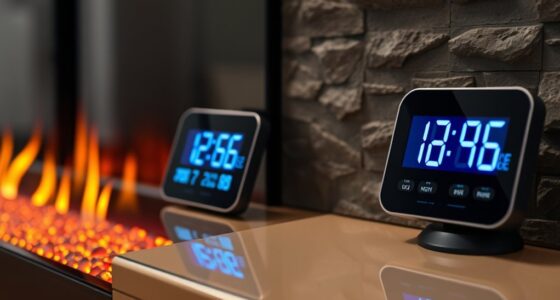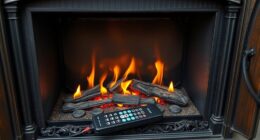To master running cost math for heaters in a weekend, start by familiarizing yourself with basic terms like watts, kilowatt-hours, and energy efficiency. Learn how to calculate energy use by multiplying the heater’s power rating by usage hours, then estimate costs based on your energy rates. Comparing different models and applying simple formulas can help you cut expenses. Keep going, and you’ll uncover even more ways to optimize your heating costs effectively.
Key Takeaways
- Understand heater power ratings (kW) and convert usage hours into energy consumption (kWh).
- Calculate operational costs by multiplying energy use (kWh) with local energy prices.
- Familiarize yourself with key terms like efficiency, wattage, and maintenance to interpret specifications accurately.
- Compare models based on energy ratings and long-term costs, not just initial prices.
- Practice estimating costs with real usage scenarios to confidently predict expenses over heater lifespan.
Understanding the Basics of Heater Power and Energy Consumption

Understanding the basics of heater power and energy consumption is essential for managing your heating costs effectively. Your heater’s power, measured in watts, determines how much energy it uses to generate heat. To optimize efficiency, start with good heater insulation; it keeps warmth in and reduces the workload on your heater. Proper thermostat settings are equally important—they influence how often and how hard your heater runs. Lowering your thermostat slightly can markedly cut energy use without sacrificing comfort. Keep an eye on the heater’s energy ratings and consider adjustable settings to fine-tune your heating. Being aware of Kia Tuning options can also help you understand the importance of system efficiency and customization. By understanding how power, insulation, and thermostat controls work together, you can make smarter choices that save money and keep your home comfortably warm.
Decoding Key Terms in the Heater Cost Glossary
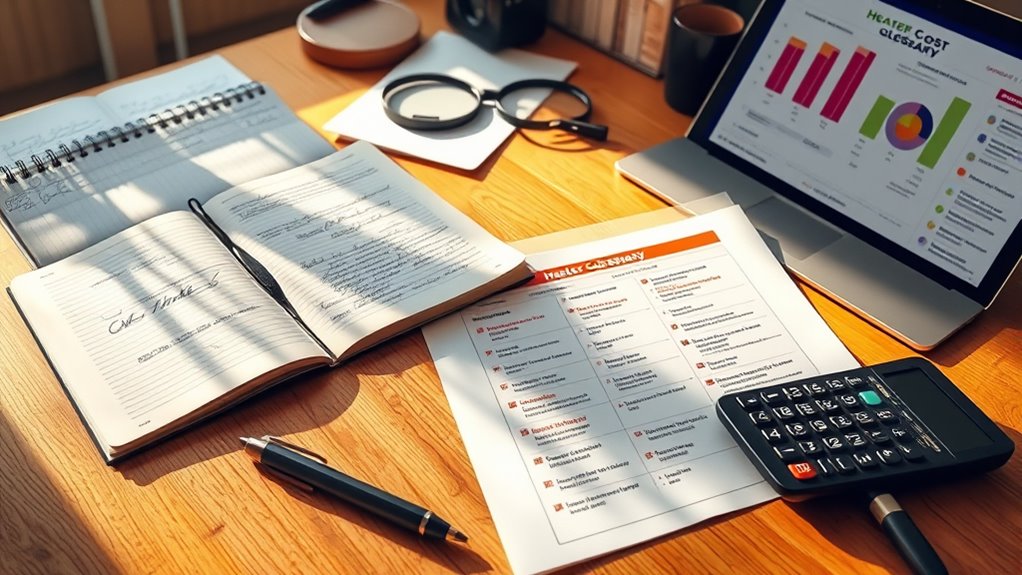
To effectively manage your heating costs, it’s important to familiarize yourself with key terms in the heater cost glossary. Understanding these terms helps you make informed decisions about heater efficiency and expenses. For example, “heater maintenance” involves routine checks and repairs that keep your system running smoothly, reducing energy waste and preventing costly breakdowns. “Safety precautions” are essential guidelines to protect you and your home during heater operation, such as ensuring proper ventilation and regular inspections. Knowing what these terms mean allows you to identify areas where you can cut costs or improve safety. Additionally, cultivating a bias to action when addressing heater issues can lead to quicker resolutions and better overall system performance. By decoding these key terms, you gain clarity on how your heater functions and how to optimize its performance without risking safety.
Calculating Your Heater’s Energy Usage With Simple Formulas
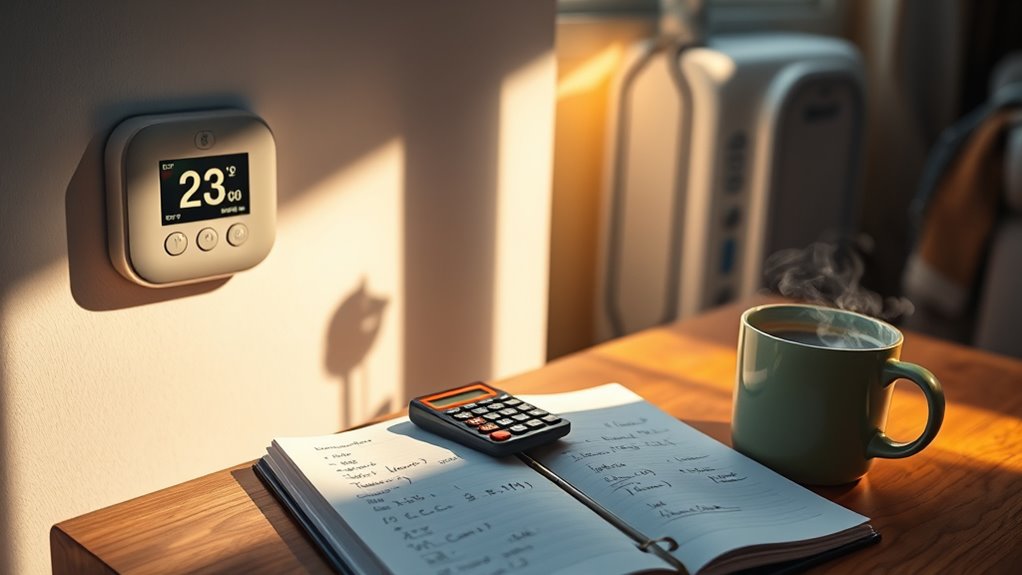
Calculating your heater’s energy usage doesn’t have to be complicated; simple formulas can give you a clear picture of how much energy your system consumes. By monitoring thermostat settings and maintaining your heater properly, you can estimate your costs more accurately. Use this basic formula:
| Power (kW) | Hours Used | Energy Consumption (kWh) |
|---|---|---|
| 1.5 kW | 4 hours | 6 kWh |
| 2.0 kW | 6 hours | 12 kWh |
| 1.0 kW | 8 hours | 8 kWh |
| 3.0 kW | 2 hours | 6 kWh |
Adjust thermostat settings for efficiency, and schedule regular heater maintenance to keep energy use ideal. Small changes can lead to big savings, especially when understanding how energy consumption impacts your overall utility bills.
Estimating Monthly and Annual Operating Costs

To estimate your heater’s monthly and yearly costs, you need to calculate its energy consumption based on your usage patterns. Don’t forget to factor in fluctuations in energy prices that can impact your overall expenses. By understanding these elements, you can better predict and manage your heating costs throughout the year. Incorporating knowledge about energy-efficient systems can further optimize your heating expenses.
Calculating Energy Consumption
Understanding how much energy your heater consumes each month and year is essential for estimating operating costs accurately. To do this, start by reviewing the heater’s power rating, usually listed in kilowatts (kW). Multiply this by the number of hours it runs each day to find daily energy use, then extend this to monthly and yearly estimates. Proper heater installation can influence efficiency, so make sure it’s set up correctly. Regular maintenance schedules help keep your heater operating efficiently, preventing unnecessary energy waste. Keep track of usage patterns and adjust your estimates accordingly. Additionally, recognizing angel number soulmate patterns can help you understand how your energy and love life are interconnected, potentially influencing your overall wellbeing. By accurately calculating energy consumption, you can better forecast costs and identify opportunities to reduce energy bills over time.
Accounting for Usage Patterns
Tracking how your heater is used throughout the month helps refine your energy cost estimates. By noting your usage frequency, you can better understand how often your heater runs during different periods. Seasonal variations play a significant role, as heating needs spike in winter and drop during milder months. Adjust your calculations based on these fluctuations to get a more accurate picture of your annual costs. Keep a simple log of daily usage, noting days when you use the heater more or less. This data helps you identify patterns and refine your estimates for both monthly and yearly expenses. Understanding your usage habits ensures you don’t over- or underestimate costs, making your budgeting more precise and helping you optimize your heater’s efficiency over time. Incorporating cost analysis techniques from financial planning can further enhance your understanding of long-term expenses.
Incorporating Cost Fluctuations
Incorporating cost fluctuations is essential for estimating your heater’s monthly and annual operating expenses accurately. Price variability affects fuel or electricity rates, which can rise or fall unexpectedly, impacting your overall costs. Additionally, disruptions in the supply chain can cause delays or shortages, leading to price hikes. To account for these fluctuations, consider historical data and current market trends, and add a buffer to your estimates. Keep an eye on energy market reports and supplier updates to adjust your calculations proactively. By factoring in these potential changes, you gain a more realistic view of your heater’s long-term costs, preventing surprises and helping you plan your budget more effectively. Recognizing seasonal and market trends can further refine your cost management strategies for better financial planning.
Comparing Different Heater Options for Cost Efficiency
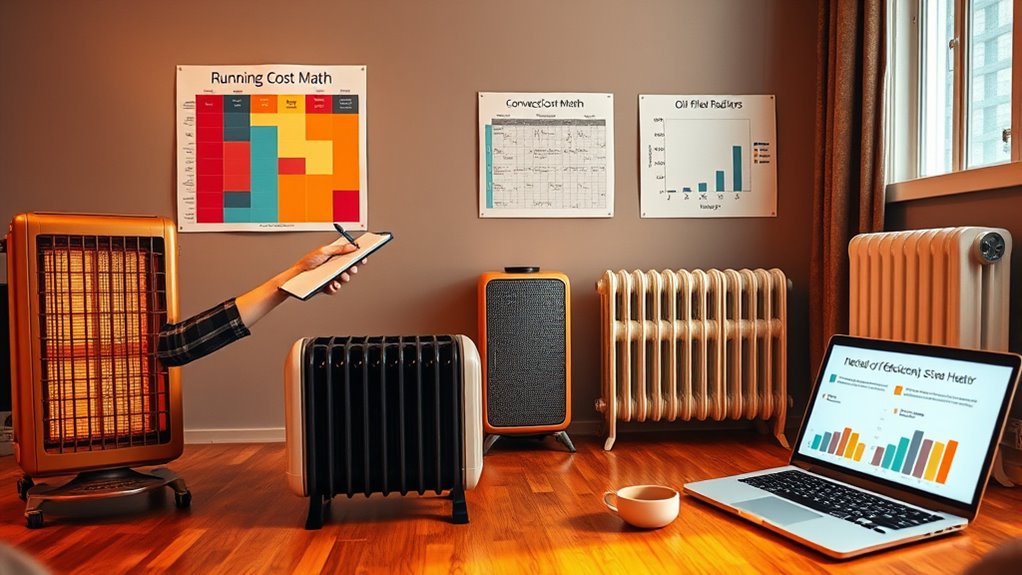
When comparing heater options, you should pay attention to energy consumption rates to understand how much power each model uses. Long-term operating costs depend on these rates and how often you’ll run the heater. By analyzing both factors, you can choose the most cost-efficient option for your needs. Additionally, consider noise levels of modern heat pumps, as quieter operation can enhance comfort without increasing costs.
Energy Consumption Rates
Ever wondered how different heaters stack up regarding energy consumption? It’s crucial to compare their rates based on heater insulation and power supply options. Some models use more energy because poor insulation lets heat escape, increasing costs. Others might rely on power sources like electricity, gas, or solar, each with varying efficiency levels. To help you decide, here’s a quick comparison:
| Heater Type | Estimated Energy Use |
|---|---|
| Electric Panel | Low (good insulation) |
| Gas-Fired Radiator | Moderate |
| Infrared Heaters | Varies (depends on insulation) |
Understanding these differences helps you choose an option that minimizes energy costs without sacrificing warmth. Always check the energy consumption rates listed in specs to ensure your heater aligns with your budget and heat pump efficiencies.
Long-term Operating Costs
Are you aware of how the long-term costs of different heaters can impact your budget? Beyond upfront prices, consider heater installation expenses and how often you’ll need maintenance. Some units may be cheaper initially but require frequent repairs or early replacements, increasing overall costs. Comparing maintenance schedules helps you understand ongoing expenses, as regular upkeep can prolong heater lifespan and efficiency. Energy-efficient models might have higher initial prices but lower operating costs over time. Also, evaluate warranties and service support, which can reduce future expenses. By analyzing these long-term factors, you’ll make smarter choices that save money in the long run. Remember, the most economical heater isn’t just about purchase price but how well it performs and costs over its entire lifespan. Additionally, understanding long-term operating costs can help you choose models that balance initial investment with ongoing expenses for maximum savings.
Tips to Reduce Heater Running Costs and Save Money
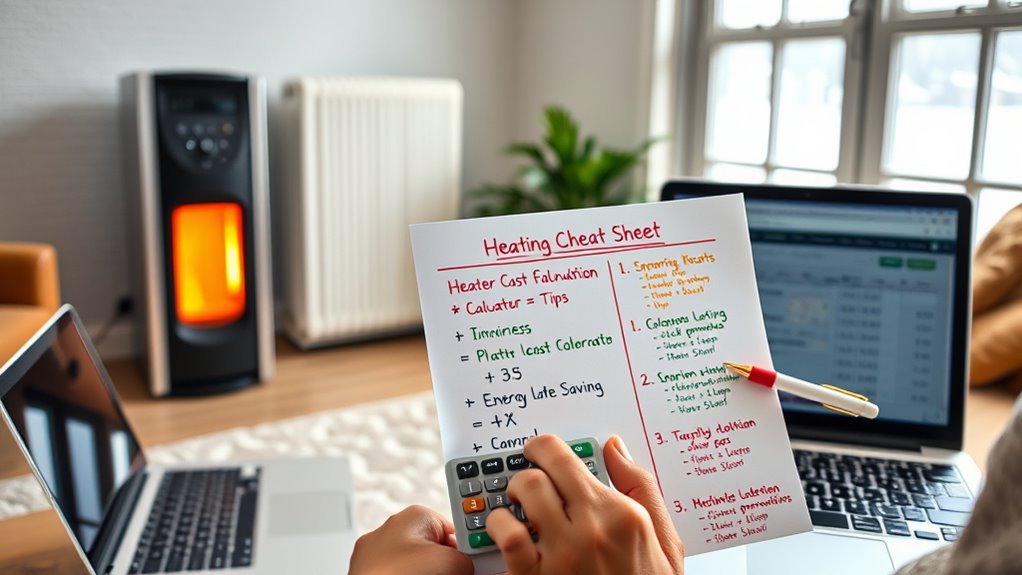
To cut your heating costs, start by optimizing your heater’s efficiency. Proper heater placement is essential—position it away from drafts, obstructions, or heat-absorbing surfaces to maximize warmth. Next, focus on insulation enhancements; sealing leaks around windows, doors, and vents prevents heat from escaping and reduces the workload on your heater. Installing curtains or thermal blinds can also help retain heat overnight. Regular maintenance, like cleaning filters and checking for malfunctions, guarantees your heater runs smoothly. Lowering the thermostat by just a degree or two makes a significant difference over time. By combining strategic heater placement with insulation improvements, you’ll use less energy, cut costs, and stay warm without overspending.
Frequently Asked Questions
How Can I Measure Heater Efficiency Accurately?
To measure heater efficiency accurately, you should perform regular heater maintenance to keep it running as effectively as possible. Conduct a fuel cost analysis to determine how much energy your heater consumes relative to its output. Use a thermometer to monitor temperature differences and compare fuel usage against the heat produced. This hands-on approach helps you identify inefficiencies and ensures you’re getting the most heat for your fuel dollars.
What Factors Most Influence Heater Running Costs?
You can lower your heater’s running costs by focusing on proper heater maintenance and choosing the right fuel type. Regular maintenance ensures efficiency, reducing energy waste. Comparing fuel types helps you select the most cost-effective option for your needs. Consider the fuel’s price, availability, and efficiency, as these factors directly impact your overall costs. Staying proactive with maintenance and making informed fuel choices keeps your heating expenses in check.
Are There Specific Tools to Track Energy Consumption?
Yes, you can use energy monitoring tools and utility meters to track your heater’s energy consumption precisely. These devices help you monitor real-time usage, compare costs, and identify inefficiencies. By regularly checking your utility meters or investing in smart energy monitors, you stay informed, control costs, and optimize your heating system’s performance. This proactive approach guarantees you’re aware of your energy habits and can make smarter decisions to save money.
How Does Insulation Affect Heater Cost Calculations?
Insulation greatly impacts heater cost calculations by improving thermal resistance, which reduces heat loss and keeps your space warmer. Different insulation types, like fiberglass or foam, have varying R-values that determine their effectiveness. When calculating costs, consider how higher R-values lower energy needs, saving you money. By selecting suitable insulation with proper thermal resistance, you can cut down your heater’s running costs and improve overall efficiency.
Can Smart Thermostats Reduce Overall Heating Expenses?
A smart thermostat is like a wise captain steering your heating expenses. By installing one, you can optimize your heating schedule, ensuring your heater runs only when needed. This targeted control reduces unnecessary energy use, slashing your costs. With smart thermostat installation, you set it to adapt to your routine, making your home cozy without wasting cash, and helping you save markedly on your overall heating bill.
Conclusion
Mastering heater cost math in a weekend might seem intimidating, but it’s surprisingly straightforward—until you realize that even with all your calculations, the true expense often comes down to human error or unexpected energy prices. So, while you’ve nailed the formulas and decoded the jargon, remember that your wallet’s fate still hangs on unpredictable factors. Ironically, understanding costs might just make you more aware of how little control you really have over your heating bills.


